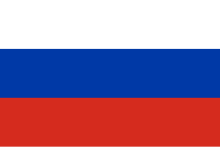
Back روسيا في الألعاب الأولمبية الصيفية 2016 Arabic ڕووسیا لە ئۆڵۆمپیادی ھاوینەی ٢٠١٦ CKB Rusko na Letních olympijských hrách 2016 Czech Rusland ved sommer-OL 2016 Danish Olympische Sommerspiele 2016/Teilnehmer (Russland) German Συμμετοχή της Ρωσίας στους Θερινούς Ολυμπιακούς Αγώνες 2016 Greek Rusio en la Somera Olimpiko 2016 Esperanto Rusia en los Juegos Olímpicos de Río de Janeiro 2016 Spanish روسیه در المپیک تابستانی ۲۰۱۶ Persian Russie aux Jeux olympiques d'été de 2016 French
| Russia at the 2016 Summer Olympics | |
|---|---|
 | |
| IOC code | RUS |
| NOC | Russian Olympic Committee |
| Website | www |
| in Rio de Janeiro | |
| Competitors | 282 in 26 sports |
| Flag bearers | Sergey Tetyukhin (opening)[1] Natalia Ishchenko and Svetlana Romashina (closing) |
| Medals Ranked 4th |
|
| Summer Olympics appearances (overview) | |
| Other related appearances | |

The Russian Federation competed at the 2016 Summer Olympics in Rio de Janeiro, Brazil, from 5 to 21 August 2016. This was Russia's sixth consecutive appearance at the Summer Olympics as an independent nation. The nation finished fourth in the medal standings, with 19 gold and 56 total medals, ensuring that Soviet and Russian athletes had never placed below fourth since they started participating in 1952.
On 18 July 2016, an independent investigation commissioned by World Anti-Doping Agency concluded that it was shown "beyond a reasonable doubt" that the RUSADA, the Ministry of Sport, the Federal Security Service (FSB) and the Centre of Sports Preparation of the National Teams of Russia had "operated for the protection of doped Russian athletes" within a "state-directed failsafe system" using "the disappearing positive [test] methodology." According to the McLaren Report, the Disappearing Positive Methodology operated from "at least late 2011 to August 2015." It was used on 643 positive samples, a number that the authors consider "only a minimum" due to limited access to Russian records. Based on these findings the International Olympic Committee called for an emergency meeting to consider banning Russia from the Summer Olympics.[2]
On 24 July, the IOC rejected WADA's recommendation to ban Russia from the Summer Olympics and announced that a decision would be made by each sport federation with each positive decision having to be approved by a CAS arbitrator. On 7 August 2016, the IOC cleared 278 athletes, while 111 were removed because of the scandal.[3]
On 7 August 2016, the International Paralympic Committee announced that it had voted unanimously to ban the entire Russian Paralympic team from competing at the 2016 Summer Paralympics, in the wake of a larger scandal that exposed the participation of Russian Olympic and Paralympic athletes in a state-sponsored doping program.
On 8 December 2016, silver medalist Misha Aloyan was found to have committed an anti-doping rule violation after testing positive for Tuaminoheptane, a specified stimulant, prohibited in-competition under S6 on the WADA Prohibited List, during an in-competition doping control on 21 August 2016. The results obtained by the athlete at the Rio 2016 Olympic Games were disqualified.[4]
On 9 December 2016, Canadian lawyer Richard McLaren published the second part of his independent report. The investigation claimed that from 2011 to 2015, more than 1,000 Russian competitors in various sports (including summer, winter, and Paralympic sports) were involved in a cover-up.[5][6][7][8] Emails indicate that athletes who tested positive for banned substances included five blind powerlifters, who may have been given drugs without their knowledge, and a fifteen-year-old.[9]
- ^ "Volleyball star Tetyukhin named Russia's Olympic flag bearer". Russian News Agency TASS. 28 July 2016. Retrieved 29 July 2016.
- ^ Ruiz, Rebecca (18 July 2016). "Russia May Face Olympics Ban as Doping Scheme Is Confirmed". The New York Times. ISSN 0362-4331. Retrieved 26 July 2016.
- ^ "Russian athletes participating in Rio Olympic Game by federation". Europe Online Magazine. 9 August 2016. Archived from the original on 9 August 2016. Retrieved 9 August 2016.
- ^ ANTI-DOPING DIVISION OF THE COURT OF ARBITRATION FOR SPORT ISSUES DECISIONS IN THE CASE OF MISHA ALOIAN
- ^ "MCLAREN INDEPENDENT INVESTIGATION REPORT – PART II". wada-ama.org. 9 December 2016.
- ^ Ruiz, Rebecca R. (9 December 2016). "Russia's Doping Program Laid Bare by Extensive Evidence in Report". The New York Times.
- ^ Ostlere, Lawrence (9 December 2016). "McLaren report: more than 1,000 Russian athletes involved in doping conspiracy". The Guardian.
- ^ . 1 August 2018 https://web.archive.org/web/20180801221511/https://www.tas-cas.org/fileadmin/user_upload/Award__5379__internet.pdf. Archived from the original (PDF) on 1 August 2018. Retrieved 22 June 2019.
{{cite web}}: Missing or empty|title=(help) - ^ Ellingworth, James (13 December 2016). "Emails show how Russian officials covered up mass doping". Associated Press. Archived from the original on 14 December 2016.